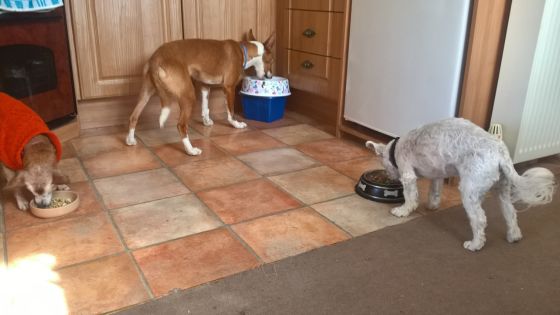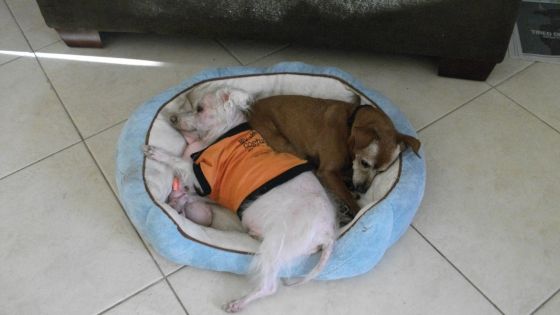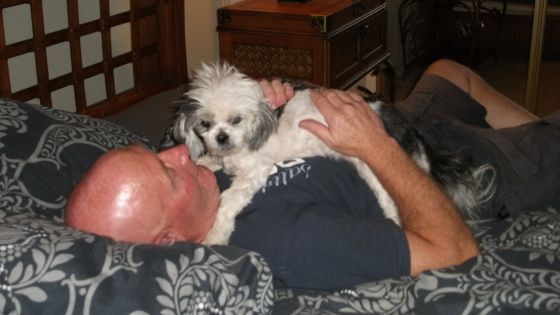I know how impossible it can be, figuring out how to cope after saying goodbye. You want to lie in bed and cry. Well, why not? I’ve done it, and it’s certainly better to cry it out to release your grief, then keep it bottled up.
From joining a pet loss grief support group and journaling, to having a funeral and creating a memorial, these are just a few things you can to do help you cope with the loss of your senior dog.
Feeling sad and grieving over the loss of an animal companion is normal, so don’t let anyone make you feel like it isn’t. When it becomes worrying is when you get lost in that grief, and can’t seem to get out of it. If you’re having trouble finding a way to cope in a healthy manner, please get grief counselling and/or find a support group.
We Can’t Avoid the Heartbreak
As much as we would like to avoid experiencing the heartbreak, the truth is – we can’t feel better if we don’t allow ourselves to first feel bad. However, feeling bad does not mean sinking into a dark place and staying there.
Finding healthy ways to cope will allow you the opportunity to grieve, to accept what has happened, learn to treasure the time you had and recover. Notice I never said forget.

18 Ways to Help You Cope with the Loss of Your Senior Dog
1) Don’t let anyone tell you how you should feel. That goes double if it’s coming from someone who doesn’t share their life with animals, or has never experienced this kind of loss. No matter how much or how little time you had with your dog you created a strong bond, and you’ll grieve as you would the loss of any other member of the family.
2) Honour your grief. Don’t deny it, don’t repress it, and certainly don’t be embarrassed by it. If that means screaming, throwing things (make them soft objects, and don’t aim at anybody please!!!!), or lying in bed in the dark, then do it. Just notice how long this is going on. Do it while it’s helpful, but don’t let it become self-destructive.
3) Surround yourself with people who understand – pet loss support groups, chat rooms, hotlines or counsellors. If you prefer to meet in person, search for pet loss support groups in your area, or choose from the many resources available online.
4) Start your own pet loss grief support group if you like the idea of meeting in person, but there aren’t any in your area. Think of how many people you’ll be helping as well!
5) Keep a journal where you can record your thoughts, feelings and memories.
6) You had a routine, and now it’s changed. It’s normal to feel out of sorts for a while. Now might be a good time to start a new hobby, try a new activity, reconnect with old friends, take a course… It will help fill that void (eventually!), and create a new outlet for you.

7) Remember all the good times. At the beginning you almost feel like they’re still around. For quite a while after my dog Bailey died, I would look down the hallway and swear I could see him looking in each room for my husband. That does fade but the memories don’t, and you’ll eventually be able to laugh at all the crazy antics they got up to.
8) Create a memorial – a plaque for your garden, plant a tree, make a scrapbook… One woman I know keeps her dogs’ urns and collars on a little side table. It’s not a depressing shrine, but a nice tasteful way to remember them and feel like they’re still part of the family. Your memorial is whatever you want it to be.
9) Many people find comfort volunteering at an animal shelter, saying they’re doing it in their dog’s memory. They have time to fill and love to give, sharing it with animals who don’t yet have a home.
10) Having a funeral is a way for you and your family to openly express grief. We do it for humans, what’s the difference if this loved one had 4 legs instead of 2? Never mind what people say, and walk away from anyone that utters a snide remark. Pet cemeteries exist, so people must be using them.
11) Go to the beach and watch the waves – do something peaceful and contemplative.
12) Read about other peoples’ grief journeys through books, blog posts or podcasts. It’s comforting knowing others have been through similar.
13) The human-animal bond has no strings attached. No games, no nonsense, just unconditional love. That doesn’t sound like something we experience too often in our human relationships, does it? No wonder the loss is so devastating. Honor what you had, treasure it, and when you’re ready, find another furry friend to bond with.
14) It is not unusual to find it hard to sleep or eat, but making yourself sick won’t help. Take care of yourself.
15) Did you know it’s possible to make jewellery and ornaments from ashes? To some this may sound bizarre, but others find comfort in always having their dog with them.
16) You know that death and taxes are two things that are inevitable. It’s hard to say and hard to accept, but we will all die – some sooner than later. It’s good to remind ourselves that life is short, and we should live and love to the fullest.
17) It may be difficult to talk about your pet right away, or even say their name. You may find it helpful to share stories and memories with others in your household. After all, they have also been affected.
18) Animals grieve too, so keep an out for changes in your other pets’ behavior, eating habits… Stick to the same routine they’ve been used to, and give them some extra TLC.
19) After experiencing the loss of a pet, many people say they are not prepared to live through that again, while others run out too quickly to try and “replace” the one that’s gone. Take some time, and when you’re starting to feel more like yourself, consider bringing a homeless animal into your life. You still have a lot more love to give, and offering a home to an abandoned animal is a beautiful thing to do.

Do You Need Help?
Some of us are really bad at reaching out and asking for help, and I’m definitely at the front of that line. We like to feel we don’t need anyone, and can do it all on our own. While that may be true in many cases, be careful of this one.
You won’t get any medals for crying alone in the dark, thoughts you can’t control constantly swirling around your head. There are online forums, FB groups, private and group counselling sessions and local support groups (some run by shelters) so you’re bound to find something you feel comfortable with.
If you’ve had to say goodbye to a much-loved animal, what helped you grieve and start to move forward. Sharing helps others so please leave your tips and advice in the comments section below.
Resources
Association for Pet Loss and Bereavement
Pet Loss Grief Support Service
I’m a certified Pet Loss Bereavement Specialist, here to support you through the heartache of losing a beloved companion.
Having experienced the loss of my own cherished fur babies, I deeply understand the range of emotions that come with grief. I also know that no two journeys are the same — that’s why each session is thoughtfully tailored to your individual needs.
You’re welcome to book a free 20-minute call, giving you the space to see if I’m the right fit to support you.
Visit my website for gentle support and articles to help you cope.
I’ve been rescuing and caring for senior dogs since 2009. From vision and hearing loss to obesity, dementia, kidney disease, liver issues, cardiac problems, Cushing’s, mobility challenges and more, you could say I’ve dealt with and learned a lot! In addition to my hands on experience, I’ve taken many courses and earned several qualifications to keep learning how to help senior dogs and they include: Senior Dog Enrichment, Understanding Canine Anxiety, Care of the Senior Pet and I’m a Certified Pet Loss Specialist.
